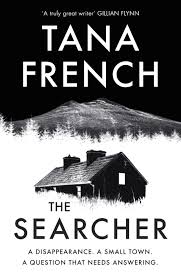Trust,
by Chris Hammer.
This is the third novel, after ‘Scrublands' and ‘Silver’, in Chris Hammer’s series featuring Martin Scarsden, journalist/crime writer, and his beautiful (of course!) lover Mandalay Blonde and, as the title suggests, trust is the virtue most prized – and most elusive – not only between the main protagonists, but the various law-enforcement agencies they are obliged to deal with, starting with Mandy’s abduction from the home in Port Silver she shares with Martin and her young son, to the final bloodbath in which Martin is trapped in one of Sydney’s most exclusive enclaves.
Never mind ‘Scandy-Noir’ – this is Aussie Noir at its
loud, Ocker, belligerent best: the plot
is labyrinthine; the reader has to keep
their wits about them as there are more characters than are really necessary –but
they are all so well-drawn it is a
pleasure to meet them, if only fleetingly in the case of some. And the teeming metropolis of Sydney has
never been so well-portrayed: it is a
rare feat to transport the reader so effortlessly to a city that Mr Hammer
obviously loves and he does his home proud, dazzling us with a landscape that
fuses city, sea and sky with stark beauty.
Except for its dirty underbelly.
Mandy has been kidnapped by a former workmate from her
youth who thinks that Mandy has access to millions embezzled from an investment
bank by Mandy’s former fiancé, who hasn’t been seen for the last five
years; everyone believes he’s living it
up overseas with all his stolen money, and the kidnapper has had to serve a
jail sentence – because she was in on his embezzlement, and sleeping with him
as well. Mandy is shattered by his
betrayal, and vows never to put her trust in another man, until she meets
Martin – but she doesn’t trust him enough to confide in him; he knows nothing of her former history beyond
what she tells him – which is precious little.
And the situation doesn’t change.
Even when she is rescued, and Martin’s former Editor and his
sister-in-law are both murdered, she still holds back information and memories
that could hinder or help their investigation.
For Martin is, first and
foremost, after the story: while he’s on
the scent, nothing is more important than to expose the truth, especially to
avenge the killing of his former Editor and friend. For that is what he’s good at. That’s his job, like it or not, Mandy.
Mr Hammer has done it again – glued us all to every page
until we managed to prise ourselves off at the end. No easy feat!
FOUR STARS.




